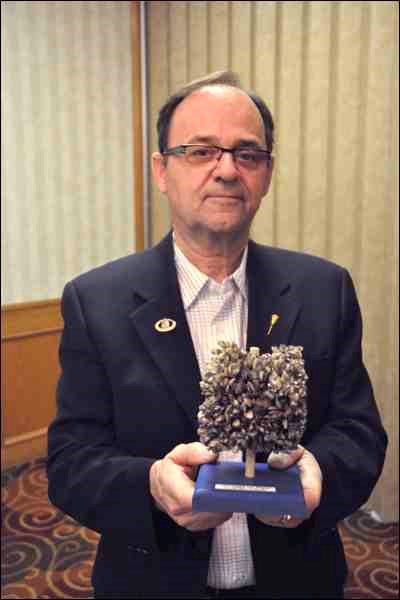Battlefords MLA Herb Cox is on a new crusade.
His latest passion, as he calls it, is against a growing menace in the waters of North America.
That menace is Quagga mussels, an invasive species from Eastern Europe that has made its way to this continent and has started wreaking havoc on rivers and lakes.
At last Wednesday's Saskatchewan Party nomination meeting at the Tropical Inn, where Cox was being re-nominated for his re-election bid, he showed party members an example of what he was talking about.
Passed around was a small, mounted, two-inch, aluminum irrigation pipe from Lake Mead, Nev., that had been in that lake for 15 months. It was completely covered by Quagga mussels.
It was a good thing that the Quagga mussels were in a room full of people and not in any kind of water, otherwise Saskatchewan would have a major situation on its hands.
"These things are absolutely lethal," an alarmed-sounding Cox told the audience. "If they get into Saskatchewan, we are into a huge problem."
On first appearance, the tiny creatures may not look like they are up to very much. But unfortunately, Quagga mussels have big appetites.
"They're what's called calcium feeders," said Cox. "They suck the calcium out of the water. They're filter feeders. They basically take all the nutrients out of the water. It's no good, it destroys the plankton and destroys everything."
The Quagga mussels were found in the Great Lakes in 1989 and have spread across the continent. Now they have made their way to the western United States, having been identified in the Colorado river system.
They were identified in Lake Mead in Nevada in 2007 and also found in Lake Havasu and Lake Mohave.
It's a situation Cox learned about through his work with the Pacific NorthWest Economic Region, a role in which he was recently named the Saskatchewan representative. He had gone to the winter meeting with PNWER in Coeur d'Alene, Idaho a year and a half ago where the topic was brought up.
When he first heard about it at PNWER, Cox said, he figured "yeah, they'll never get here, our lakes freeze up in the wintertime, it won't happen."
Unfortunately, a winter climate seems no obstacle. Last October, invasive mussels were found in Lake Winnipeg.
"They're trying to request to the federal government to basically put a perimeter around Lake Winnipeg," said Cox, to not let boats go in or out.
Now, jurisdictions across North America have been putting in place a wide range of restrictions on boats to try to quell the Quagga problem.
Quagga mussels originated in the Dnieper river in Ukraine. It isn't a big problem over there because those lakes and water systems aren't high in calcium, Cox noted.
The problem in western Canada and Ontario is that the lakes are high in calcium, and as a result these mussels can spread prolifically. "One female can have over a million eggs a year," Cox said.
Cox noted northern Ontario is a particular problem area because those lakes are high in calcium. Now, the fear is they will come west.
What is scary, Cox noted, is how easy it would be for Quagga mussels to come to Saskatchewan. He noted a situation recently where one owner was buying a new boat and bringing it up from the USA bound for Saskatchewan.
But the border inspector in Idaho did a check and found Quagga mussels on the boat, and it was impounded for 30 days so it could be cleaned up.
"Had they not caught that boat we'd have had Quagga mussels in Saskatchewan," said Cox. "That's how quick it can come."
The problem is not only showing up on the boats. Cox also made the point that the eggs could hide in outboard motors as well.
The problem is so widespread that the only region of North America that doesn't have Quagga mussels yet is the Pacific Northwest. Idaho has been particularly active in dealing with the situation, Cox noted.
But with Manitoba now dealing with a mussel problem, the issue is moving closer, Cox said.
With Quagga now in Lake Mead, the concern is they may end up causing problems on Hoover Dam as they might eat the calcium right out of the concrete.
"It's just multi-billions of dollars to fight this thing," said Cox.
Cox stressed the need for vigilance in making sure Quagga mussels stay out of Saskatchewan. The MLA stressed to the audience the need to make sure anyone taking a boat in or out of the United States have their boats checked for Quagga mussels.
"The only defence is to stop them."



